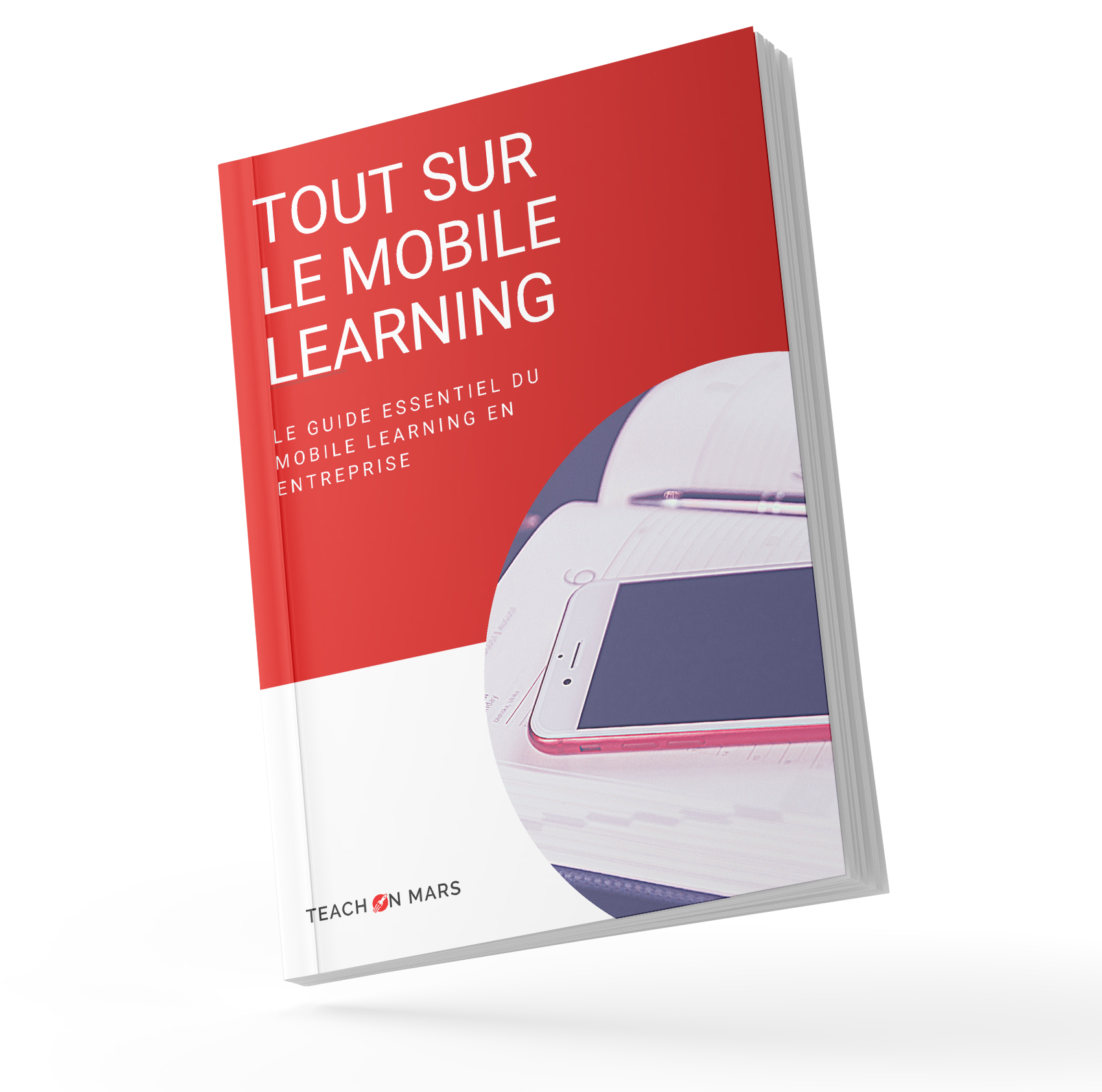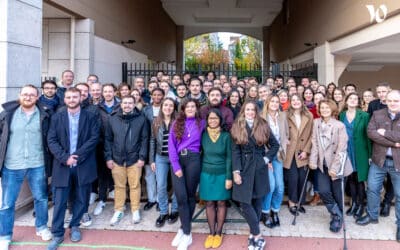Blended working was born out of the pandemic, which dramatically altered ways of working and ushered in remote working as an enduring part of how we operate. The standardisation of remote working is disrupting social relations in companies, the feeling of belonging and ways of communicating as a team and transversally.
Definition: Blended Working refers to methods established to address a new hybrid way of operating, which combines in-office and remote working. Blended Working integrates the adjustments indispensable to hybrid working.
In this series of 3 articles, you will discover our 3 recommendations for offering greater support for hybrid working. To deal with these deep shifts, company life must be reinvented and remote working should be viewed as a new possibility for retaining employees, rather than a risk. To progress towards this hybrid approach, drawing inspiration from blended learning seems to be an attractive opportunity, as its principle is based on the same method, combining in-office and remote.
Supporting employees through changing times to put people first once again
With the pandemic, companies have understood that employees are central to business concerns.
“The epidemic severely downgraded the working conditions of one in ten employees, but improved those of one in twenty, according to a survey published by the French Ministry of Labour.” Les Échos
The exclusively remote working period, and the hesitant return to the office, have engendered new working methods which require support for optimal benefit, while mitigating risks and minimising drawbacks. To support employees’ shift to blended working, some companies have already dabbled with new ideas:
« For six weeks, nine willing employees worked on three areas: the balance between in-office and remote, the quality of home working conditions and the reconfiguration of office spaces”, Emery Jacquillat – Camif Matelsom
Good practices also nurture the idea of a working model which combines all the benefits of remote working with group moments at the office.
Hybrid working accelerates the need for training, in particular in the areas of health and safety. There’s a need for greater awareness!
The imposition of remote working during the first lockdown was an unnerving time for many.
Discovering new ways of working and interacting, as well as new tools, quickened a development which should have been slower-paced. This discovery was experienced differently by different employees, some of whom fell into bad habits or practices. Hybrid working doesn’t come easily to everyone and requires support.
“Remote working calls for a managerial revolution, which must be supported, in particular by means of a training drive both for the employees, who are required to work remotely, and for team managers. Assistance with remote working conditions may also be necessary”.
8 questions about the future of remote working; are we moving towards a remote working revolution? – Senate Information Report – Oct 2021
Managers have often found themselves ill-prepared to manage their team remotely and the new issues borne out of remote working. Training has become key in this context, and that’s why courses about remote working have witnessed exponential growth over the last two years.
Similarly, courses about occupational stress, correct posture and all the issues regarding health and safety, all needed to be digitised quickly to make them accessible to as many people as possible, particularly under real-life conditions.

Giving meaning back to work at a time when remote working is disrupting it – more training is required!
Loss of meaning has been a subject of major importance in organisations since the start of the pandemic. Many people have seen the bedrock of their on-the-job motivation well and truly unsettled, in particular for those who considered their team to be their driving force. Remote working has eroded the motivation some people found in their work. Blended Working must address this issue because loss of meaning can be harmful to employees’ mental health, (solitude, anxiety, etc.).
Deloitte about its study on the meaning of work, “Over the last six months, 8 employees out of 10 have spoken about the meaning of work, of which 1 out of 2 in their working environment”
There are 6 variables when it comes to meaning of work:
• Social utility
• autonomy
• learning and development
• coherence with one’s own values
• a feeling of belonging and the quality of relationships
• recognition
Training, in particular about topics connected with skills development and career management, can bring meaning and direction to employees. By developing mobile learning training, training courses are more accessible and available at any given time, whether the employee is working in-office or remotely.
To go further with this, by suggesting courses on non-professional topics, (good digital ecology practices, exploring your relationship with stress, etc.), employees can develop their social utility, cultivate themselves or foster their own values.
Thanks to a recognition system implemented as part of this training, (certification, badges and rankings) employees can also feel valued by their organisation. Of course, the manager has a key role to play in this validation.
Employees should be monitored and supported in their Blended Working endeavours
When it comes to training, the statistics are clear: one of the greatest sources of motivation for employees is mentoring.
The motivating factors for starting an online course are:
1. course topic (connected to the business requirement),
2. obtaining certification
3. a mentor.Mentoring is the key motivating factor for completing a training course.
It won’t come as any surprise then, to support employees, it’s important to guide, coach and support them through the changes, in particular as part of a Blended Working approach. Managers must take on the role as coach or at least as guide, without becoming overbearing with regard to an employee’s work.
In a coaching position, managers will need to recommend practices and implement new initiatives such as in-office days, remote team discussion areas and training courses not to be missed.
There are many tools out there, but Teach on Mars has developed Add-on Coaching to enable managers and coaches to discuss, make course recommendations and assess skills, thus enabling them to maintain their managerial position remotely.

Creating remote discussion areas – encouraging peer communication
The manager’s support is not the only motivating factor for starting and completing a course. The community too has a role to play. In a hybrid working situation, the notion of the team is sometimes difficult to sustain. With split teams who no longer see each other regularly, who don’t necessarily work remotely on the same days and who have to keep a distance at the coffee machine, there are many challenges to fostering a team spirit.
However, by drawing inspiration from social networks, we see that a community and team spirit can easily be sustained beyond IRL (in real life) gatherings, and for that you need to be able to create discussion and exchange areas to enable bonds to reform remotely.
Conversational tools have become more widespread, along with Teams, Meet and Zoom meetings. At Teach on Mars, to optimise discussions, Learning Communities (discussion areas dedicated to a specific training topic) have been established in which to exchange recommendations, best practices and questions.
Supporting employees is vital for Blended Working, which looks like it’s here to stay. Thanks to mobile learning, training has never been so accessible or tangible, meaning that good hybrid working practices can be acquired while employees continue to develop more skills. It’s also possible to create a new and electronic working environment to continue communicating as a team; something which is crucial for nurturing the feeling of belonging and employee engagement.

D’abord éditrice de manuels scolaires, professeure et coordinatrice pédagogique à l’Université, Julia a rejoint l’équipe Learning Experience chez Teach on Mars pour apporter ses compétences en pédagogie. La gamification et la différenciation pédagogique sont notamment ses chevaux de bataille.





